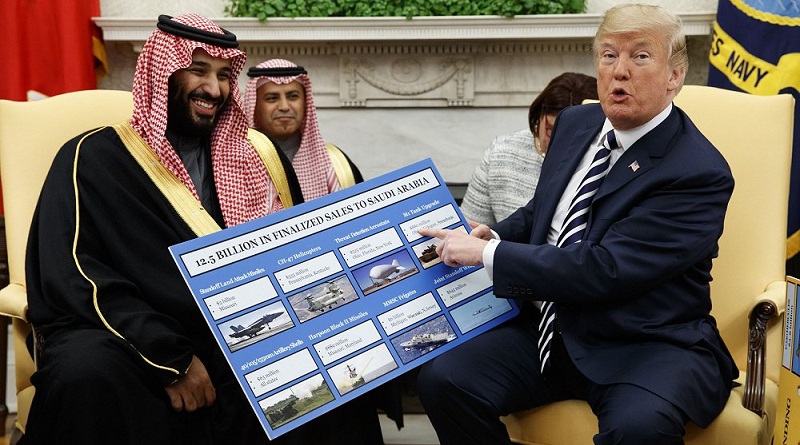Arms control experts are raising concerns about a possible loophole in the Trump administration’s new arms export policy, arguing that it gives the administration further cover to sell weapons to some of the world’s worst human rights violators.
When it was issued in April, the Trump administration’s Conventional Arms Transfer policy was widely panned by critics for prioritizing the profits of weapons companies ahead of transparency and human rights concerns. The White House was blunt about its intentions, promising that the executive branch would “advocate strongly on behalf of United States companies.”
But one change in particular may make it easier for American companies to sell weapons to governments that routinely kill civilians in conflicts by discounting killings that the governments claim are unintentional. The change could have a significant impact on sales to Saudi Arabia and the United Arab Emirates — the top two U.S. weapons clients — both of which are engaged in a destructive bombing campaign in Yemen.
The loophole hinges on the insertion of one word in a section that is otherwise identical to the Obama administration’s conventional arms policy, which was issued in 2014. While the previous policy prohibited arms transfers to countries that perpetrate “attacks directed against civilian objects or civilians,” the Trump administration policy bars such transfers to countries that commit “attacks intentionally directed against civilian objects or civilians” (emphasis added).
The release of the new policy was followed by a two-month public comment period that ended last month. On Monday, the State Department issued a fact sheet on the policy’s implementation, which promised it would energize a “whole-of-government effort to expedite transfers that support [the administration’s] essential foreign policy and national security objectives.”
Colby Goodman, a researcher on arms sales and director of the Security Assistance Monitor at the Center for International Policy, said arms control groups had objected to the word “intentional,” but no change was reflected in the guidelines released Monday.
“Depending on how this policy is implemented, this focus could make it harder for those in the U.S. government [with] legitimate human rights concerns to block or modify some proposed U.S. arms sales,” Goodman told The Intercept.
The loophole is particularly significant in light of the destructive Saudi and Emirati-led bombing campaign in Yemen, where civilian deaths are routinely termed inadvertent or unintentional.
Throughout its three-year bombing campaign, the Saudi and UAE-led coalition has repeatedly bombed civilian targets, striking homes, markets, food sources, and even schools, hospitals, and water infrastructure. These attacks have become so common that human rights groups have called for an arms embargo on Saudi Arabia.
Both the Obama and Trump administrations have resupplied the coalition through arms sales, content with coalition claims that the strikes are unintentional mistakes. Under Obama’s 2014 policy, the U.S. rebuffed human rights groups and sold the coalition more than $20 billion in weapons.
As part of an effort to push back against criticism, Saudi Arabia and the UAE formed a body called the “Joint Incidents Assessment Team” in 2015 to investigate civilian deaths. But rather than holding the coalition accountable, the body frequently parrots its rhetoric that strikes are unintentional mistakes, according to Kristine Beckerle, Yemen researcher at Human Rights Watch.
“‘I didn’t mean to’ is not a sufficient excuse for the Yemenis still grieving [for] their loved ones killed or wounded — they deserve accountability, compensation,” Beckerle told The Intercept. “Even if the coalition didn’t intend to bomb a wedding, a home, a hospital, it doesn’t necessarily follow the strike was lawful, that an individual didn’t commit a war crime — there’s a lot more to the laws of war than that.”
In 2016, for example, the JIAT found that a strike against a residential complex in western Yemen had been “unintentional.” Later that year, it found that the bombing of a Médecins Sans Frontières-run hospital was an “unintentional error,” despite the fact the buildings were clearly marked as MSF medical facilities. And last year, after the coalition bombed a water factory in Yemen’s Hajjah directorate, the JIAT found that “the bomb went off course and fell on the factory unintentionally.”
The Trump administration’s policy may help the U.S. facilitate further arms sales by relying on the pretext that these types of bombings, though recurrent, are unintentional. “Those hoping this administration might learn lessons from the past about how U.S. weapons ended up being misused, or show proper restraint in sales to countries such as Saudi Arabia and the UAE, have nothing to cheer in the new policy or its implementation plan to date,” said Jeff Abramson, a senior fellow at the Arms Control Association.
In May, shortly after the coalition bombed a wedding party in North Yemen, the State Department briefed Senate staff about another possible multibillion dollar sale of air-to-ground munitions to Saudi Arabia and the UAE. The sale is currently being held up by Sen. Bob Menendez, D-N.J., over concerns about civilian casualties.
Source: The Intercept



























